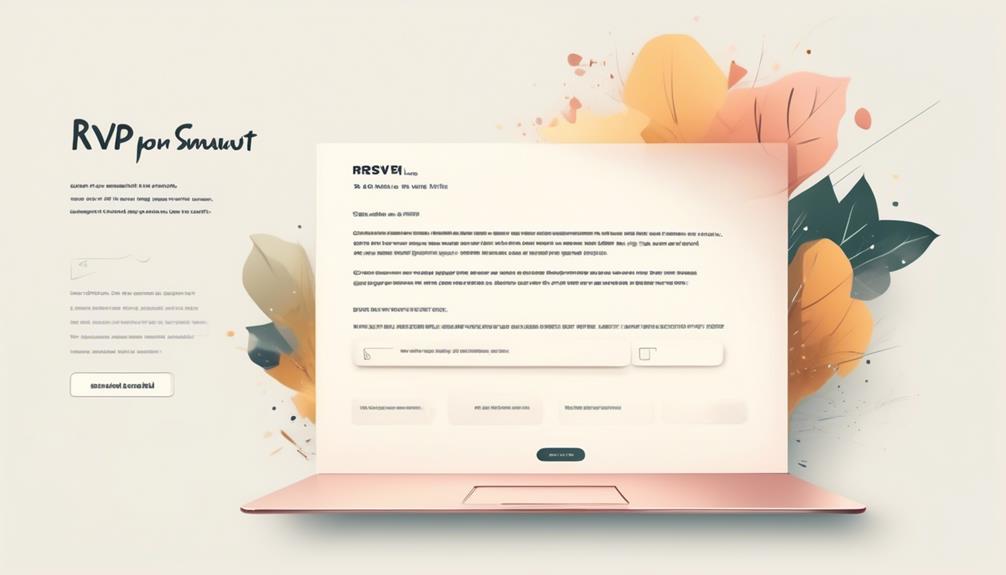When contacting our advisors, mastering the nuances of professional communication is crucial. We aim to craft our emails with a perfect mix of formality and friendliness, successfully communicating our requirements and inquiries.
How do we manage this delicate dance? Well, let's explore some key strategies that can help us master the art of composing emails to our advisors, fostering strong and effective communication channels.
Key Takeaways
- Use a clear and descriptive subject line to capture the advisor's attention.
- Address the advisor with a formal salutation and their proper title and last name to show respect.
- Maintain professionalism by using full sentences, proper grammar, and avoiding slang or emojis.
- Keep the email brief, focused, and to the point to respect the advisor's time.
Email Etiquette
In our communication with our advisor, it's essential to adhere to proper email etiquette to convey professionalism and respect. When crafting an email to our Academic Advisor, it's crucial to use a clear and descriptive subject line that accurately reflects the purpose of our message. This enables our advisor, such as Professor Last, to understand the content and urgency of our email.
Addressing our advisor with a formal salutation, such as 'Dear Professor Last,' and using their proper title and last name demonstrates our respect for their position. Furthermore, maintaining professionalism in our email is vital. This means using full sentences, proper grammar, and refraining from using slang or emojis. Our email should be brief, focused, and to the point, respecting our advisor's time.
When closing our email, a polite phrase such as 'Thank you for your time and consideration' followed by our name adds a courteous touch. It's equally important to reply to emails from our advisor in a timely manner. By doing so, we demonstrate our respect for their time and show our responsiveness as a student.
Adhering to these email etiquette guidelines will contribute to effective and respectful communication with our Academic Advisor.
Requesting Meetings or Updates

We are reaching out to schedule a meeting with our academic advisor to discuss our progress and seek guidance on upcoming courses. When requesting meetings or updates, it's crucial to use a clear and informative subject line that conveys the purpose of the email, such as 'Meeting Request: Course Guidance.'
In the body of the email, we should address our advisor with their proper title and last name, providing a brief introduction and context for the meeting request. It's important to articulate our specific needs or questions to ensure that the advisor can adequately prepare for the meeting. For instance, we may mention our desire to review our current course load, explore potential elective options, or seek advice on internship opportunities.
We should also inquire about the advisor's office hours and availability, allowing for flexibility in scheduling the meeting. Ending the email with a polite and professional closing, including our full name, demonstrates respect and courtesy.
Professional Tone and Clarity
With a focus on maintaining a professional and respectful tone, our email to the advisor should clearly and succinctly convey our specific needs or inquiries, using formal language and avoiding informal expressions.
When addressing the advisor, it's important to use their proper title and last name, such as 'Professor Smith.' This helps to maintain a professional tone and show respect for their position.
In the body of the email, it's essential to clearly state the purpose of the communication and the specific information or assistance being sought. It's advisable to use complete sentences with proper grammar and avoid using slang or emojis to ensure clarity and professionalism.
When closing the email, a polite and respectful concluding phrase, such as 'I look forward to hearing from you,' followed by your name, helps to end on a professional note.
Building a Professional Relationship

Demonstrating professional courtesy and respect in all interactions with the advisor is essential for building a strong and effective professional relationship.
When composing emails to your advisor, it's crucial to establish a courteous and respectful tone. This can be achieved by using formal greetings and closings, addressing them with their appropriate title, and expressing gratitude for their time and expertise. Additionally, seeking advice and guidance from your advisor in a proactive and respectful manner can help foster a positive professional relationship.
When communicating, it's important to maintain clarity and professionalism by using proper grammar and avoiding informal language.
In some cases, it may also be beneficial to meet with your advisor in person to further solidify the professional relationship. This can provide an opportunity for more personal and direct communication, allowing for a deeper understanding of expectations and goals.
Best Practices for Academic Communication
When composing academic emails, it's crucial to use a clear and concise subject line to effectively communicate the purpose of the communication. This not only helps the advisor understand the context at a glance but also demonstrates professionalism.
To ensure effective academic communication, we should also address the recipient with a polite greeting and their proper title and last name, creating a respectful and professional tone from the outset.
Additionally, providing a brief introduction that includes relevant details such as your name, year, major, and specific course information helps personalize the email and shows that you value the recipient's time and attention.
- By using a clear and concise subject line, we convey professionalism and respect for the advisor's time.
- Addressing the recipient with a polite greeting and their proper title and last name fosters a positive and respectful tone in the email.
- Providing a brief introduction with relevant details helps personalize the communication and demonstrates consideration for the recipient's time and attention.
Frequently Asked Questions
How Do You Start an Email to an Advisor?
We start an email to an advisor with a clear and concise subject line that indicates the purpose.
We then use a polite greeting with the advisor's proper title and last name.
A brief introduction follows, including our name, major, and the reason for contacting the advisor.
We maintain a professional tone, using full sentences, proper grammar, and a courteous tone.
We end the email with a formal closing and our name.
How Do You Address a Counselor in an Email?
When addressing a counselor in an email, we use a formal salutation like 'Dear Counselor [Last Name],' to show respect.
It's important to provide a brief introduction with our name, program, and the purpose of the email for easy identification.
Keeping the email professional with proper grammar and a courteous tone is essential.
Ending with a formal closing, such as 'Best regards' or 'Thank you,' maintains a professional tone and shows respect.
How Do I Email Program Advisor?
When we email a program advisor, it's important to be clear and concise. We should introduce ourselves, state the purpose of our email, and include any relevant details or questions.
Additionally, it's important to use a professional tone and proper email etiquette. We want to make sure our email is well-written and respectful, as the advisor's time is valuable.
It's also a good idea to proofread our email before sending to ensure it's error-free.
How Do You Message a College Advisor?
Dear Professor [Last Name],
I hope this email finds you well. I am reaching out to discuss my course schedule for the upcoming semester. I am currently a junior majoring in [Major], and I have a few questions regarding the courses I need to take.
I have reviewed the course catalog and have some concerns about the availability of certain classes that are required for my major. I would greatly appreciate your guidance in selecting the appropriate courses to ensure I stay on track with my academic plan.
I understand that you are very knowledgeable about the requirements for my major and would greatly appreciate your assistance in this matter. If it is convenient for you, I would like to schedule a meeting to discuss my course options further.
Thank you for your time and attention to this matter. I look forward to hearing from you soon.
Sincerely,
[Your Name]
Conclusion
In conclusion, remember to always maintain a professional tone and follow email etiquette when communicating with your advisor.
Are you ready to build a strong and professional relationship with your advisor through effective communication?
Keep your emails brief and to the point, and always be respectful of their time and responsibilities.
By following these best practices, you can ensure that your academic communication is clear, professional, and effective.









